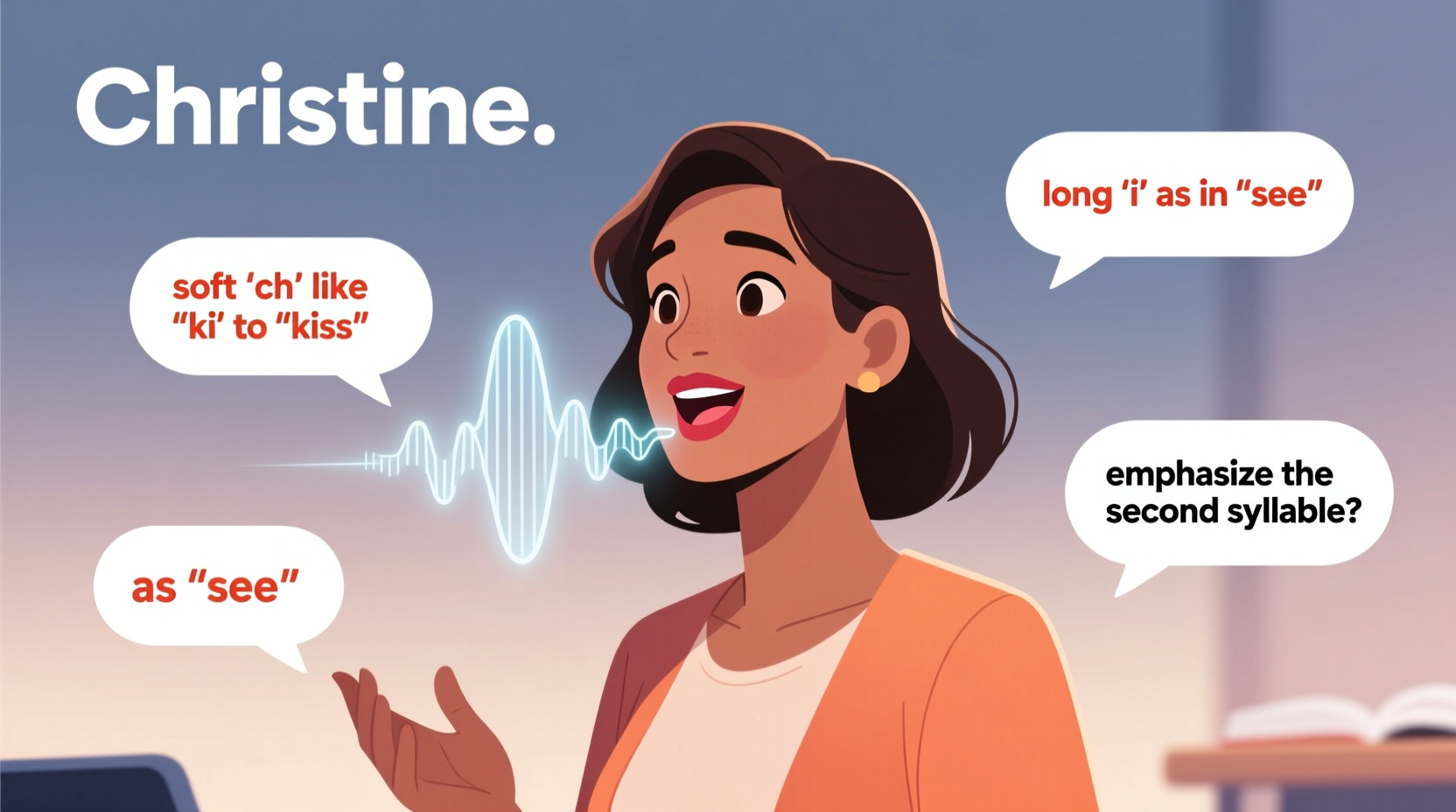Pronouncing names correctly is more than a matter of linguistic accuracy—it’s a sign of respect, attentiveness, and effective communication. Among common names that often trip up speakers is \"Christine.\" Despite its familiarity, variations in accent, regional speech patterns, and phonetic confusion can lead to mispronunciations that undermine clarity and confidence. Whether you're introducing someone in a meeting, addressing a colleague, or practicing English as a second language, mastering the pronunciation of \"Christine\" can enhance your verbal precision and interpersonal impact.
This guide breaks down the correct articulation of \"Christine,\" explores common errors, and provides actionable strategies to help you speak with clarity and assurance. From phonetic analysis to real-world practice techniques, you’ll gain the tools needed to pronounce this name—and others like it—effortlessly and accurately.
The Correct Pronunciation: A Phonetic Breakdown

\"Christine\" is typically pronounced in three syllables: /krɪˈstin/ (krih-STIN). Let's dissect this step by step:
- First syllable (Krih): The \"Chr\" is pronounced like \"Kri\" — not \"Shri\" or \"Tris.\" The \"ch\" here makes a hard \"k\" sound, as in \"Christ\" or \"chrome.\"
- Second syllable (Stin): The stress falls on the second syllable, making it the loudest and longest part of the word. It sounds like \"steen,\" not \"stin\" as in \"thin.\"
- Vowel clarity: The final \"e\" is silent; the name ends cleanly with the \"n\" sound.
In American English, the pronunciation leans toward \"krih-STEEN,\" with a slightly elongated \"ee\" sound. In British English, it may be closer to \"kris-TEEN,\" though both are acceptable depending on personal or regional preference.
Common Mispronunciations and Why They Happen
Mispronouncing \"Christine\" often stems from pattern recognition errors. Our brains tend to group unfamiliar words into known sound clusters, leading to predictable mistakes:
| Mispronunciation | Why It Occurs | Correction |
|---|---|---|
| “Shris-teen” | Confusing “Chr” with soft “ch” as in “Christian.” | Use a hard “k” sound at the beginning. |
| “Tris-teen” | Mistaking “Chr” for “Tr,” especially in fast speech. | Ensure the initial consonant is “k,” not “t.” |
| “Chris-tine” (as in “tine” like “spine”) | Overemphasizing the first syllable due to spelling. | Shift stress to the second syllable: “krih-STEEN.” |
| “Kris-tin” (with short ‘i’) | Underpronouncing the long “ee” vowel. | Extend the “ee” sound: “steen,” not “stin.” |
These errors are common even among native speakers. Awareness is the first step toward correction.
Step-by-Step Guide to Mastering the Pronunciation
Becoming confident in how you say \"Christine\" requires deliberate practice. Follow this sequence to build muscle memory and auditory awareness:
- Listen to native models: Use trusted online dictionaries like Cambridge or Oxford Learner’s Dictionary to hear audio samples of “Christine” pronounced in both American and British English.
- Break it into syllables: Practice saying “krih” – “steen” slowly, exaggerating each part.
- Mark the stress: Clap or tap when you say “steen” to reinforce the correct emphasis.
- Record yourself: Use your phone to record your attempt, then compare it to the model pronunciation.
- Practice in context: Use the name in full sentences: “Christine will lead the presentation,” or “I spoke with Christine earlier.”
- Repeat daily: Spend 2–3 minutes each day rehearsing until the pronunciation feels automatic.
Expert Insight: The Power of Accurate Name Pronunciation
Names carry identity, culture, and personal significance. Mispronouncing them—even unintentionally—can create distance or discomfort in professional and social settings.
“Getting a name right shows emotional intelligence. It signals that you’re listening, you care, and you respect the individual.” — Dr. Lena Patel, Speech Communication Specialist, University of Michigan
Dr. Patel emphasizes that consistent attention to name pronunciation builds trust and inclusivity, particularly in diverse workplaces. She recommends proactive clarification: “When in doubt, politely ask, ‘How do you pronounce your name?’ It’s a small gesture with a lasting positive impact.”
Real Example: Overcoming a Lingering Misstep
Sarah, a project manager in a multinational tech firm, introduced her new team member as “Kris-TINE” during a virtual all-hands meeting. Afterward, she received a gentle message: “Actually, it’s krih-STEEN. No worries—I’m used to it!” Though well-intentioned, Sarah felt embarrassed and realized she had mispronounced the name for weeks.
Determined to improve, she used the syllable breakdown method, listened to audio clips, and practiced saying the name aloud five times each morning. Within a week, she reintroduced the team member on a call—this time with perfect clarity. Her colleague smiled and later thanked her for the effort. That small correction strengthened their working relationship and set a tone of mutual respect.
Checklist: Speak \"Christine\" with Confidence
Use this quick-reference checklist to ensure mastery:
- ✅ Start with a hard “k” sound, not “sh” or “t”
- ✅ Divide into two key parts: “krih” + “steen”
- ✅ Stress the second syllable: “krih-STEEN”
- ✅ Avoid pronouncing the “i” in “-tine” as short “ih”
- ✅ Record and compare your pronunciation weekly
- ✅ Use the name in conversation regularly
- ✅ Ask for feedback if uncertain
Frequently Asked Questions
Is it ever correct to say “Shris-teen”?
No. While some might associate the “Ch” with the soft “sh” sound (as in “Charles”), in “Christine,” the “Ch” retains the hard “k” sound derived from Greek roots. “Shris-teen” is widely considered incorrect in standard English.
Does regional accent affect how I should say “Christine”?
Slight variations exist—American English often uses “krih-STEEN,” while British English may lean toward “kris-TEEN”—but the core elements remain: a hard initial consonant and stress on the second syllable. Choose the version that aligns with your dialect, but avoid distorting vowels or shifting stress.
What if I’m still unsure how someone pronounces their name?
Always ask respectfully. Try: “I want to make sure I’m saying your name correctly—could you please say it for me?” This demonstrates humility and fosters connection.
Conclusion: Speak with Clarity and Confidence
Mastering the pronunciation of “Christine” is more than a linguistic exercise—it’s a step toward more thoughtful, precise, and respectful communication. Every time you articulate a name correctly, you affirm the person behind it. With focused practice, auditory training, and mindful repetition, clear speech becomes second nature.









 浙公网安备
33010002000092号
浙公网安备
33010002000092号 浙B2-20120091-4
浙B2-20120091-4
Comments
No comments yet. Why don't you start the discussion?